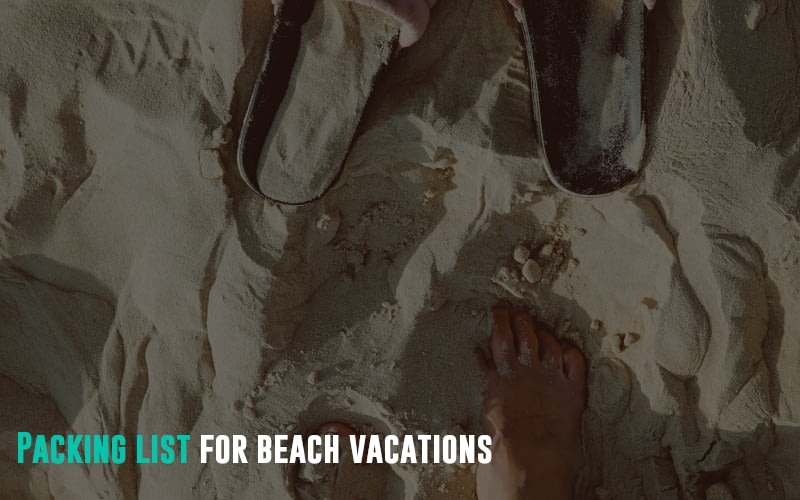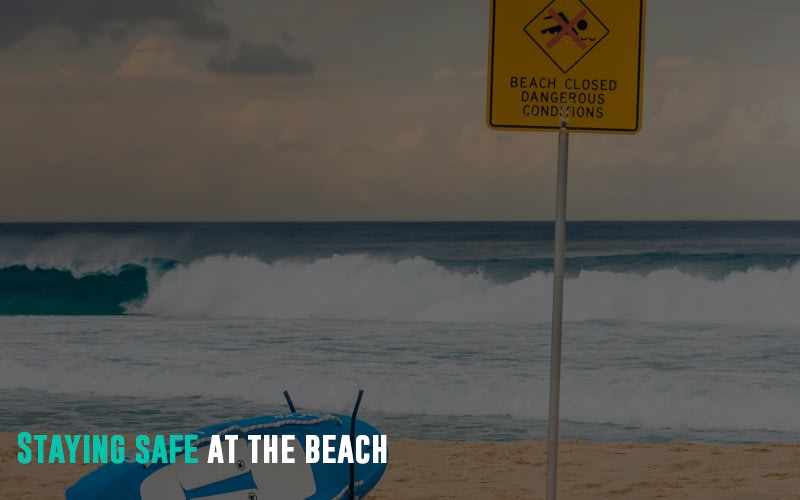Why visit the beach? Mountains or beaches? If beaches, you’re in the right place. We’re beach lovers ourselves (we love the mountains too!) and think a lot about how we can make our beach vacays more enjoyable and affordable. We’ve compiled our ideas into a post, and our beach trip planner app will further help you design a beach vacation that’s as exciting or relaxing as you’d like.
Featured Image Source
What the beach has to offer
The beach is a great way to get in touch with nature. Salty kisses and sandy hugs. Gorgeous sunsets. Fresh ocean air. Few things are as calming as the beach. The water and waves promise let-your-hair-down fun and adrenaline-pumping action. Windsurfing, kite surfing, jet skiing, stand-up surfing, and kite flying will stir your mind. You imagine the kids building sand castles and burying one another in the sand. If you collected seashells or driftwood on beaches as a child, you see a chance to let your inner child out.
Depending on your destination, you may be able to go on a hike and explore more of what nature has to offer. Hang out at the promenade with an ice cream cone in hand, and when dusk falls, unwind with a drink and cigar at a beach bar. Doesn’t have to be more of the same the next day. An early swim, a bonfire party, a limbo dancing competition, or an afternoon scuba-diving into the depths of the sea. Suddenly, you’re really living a fuller life!
That’s the beach for you. Now to the less fun part – putting a beach trip together. Hopefully, our ideas will help you plan systematically and create wonderful memories.
Where to stay at the beach
Depending on your budget and how close you want to be to the beach, you have a number of options for beach accommodation.
Hotels: Beach hotels are located close to the beach. Most offer amenities such as a swimming pool, spa, gym, bar, and more. Beachside hotels charge premium rates, attract high demand, and fill up fast.
Beachfront resorts: Located right across the beach or providing exclusive access to private beaches, beachfront resorts target affluent vacationers. They provide luxury amenities and services.
Private villa: Literally your temporary home near the shore, a villa rental offers unmatched privacy and tranquility, along with a host of luxury amenities and services, including house staff, a chef, a fitness room, a game room, and more.
Hostels: Pocket-friendly and ideal for solo travelers or adults traveling in groups, beach hostels are generally located a bit away from beaches.
RV parks: An RV park is located next to a beach or right at the beach. It is the default for those driving down in their big rigs. RV parks have full hookups that provide access to electricity, water, and a sewer connection.
Homestays: They can be relatively affordable, considering how most provide self-serve breakfast and home-cooked dinners. Check for proximity to beaches.
Beach activities

You might be wondering, ‘How do I plan a perfect beach vacation?’. Your experiences at the beach will count for a lot, so it’s worth visualizing some of the activities you’d like to enjoy on your vacation. Here’s a long list of activities to include in your beach trip planner:
Water sports
Water sports are fun for most. They also test your courage and skill. If you haven’t been on a jet ski or dived to the bottom of the sea to discover marine life, chalk up new experiences on your next beach trip. To quote Jack London, “The true mission of a human is to live, not exist.”
You may be familiar with all or most of these popular water sports:
- Snorkeling: A great family/group activity, snorkeling teaches adults and kids alike a thing or two about the ocean and its residents. For the record, kids can learn to snorkel by age 5-6.
- Scuba diving: A step up from snorkeling, scuba diving offers a chance to see a wider variety of marine life up close but requires more equipment.
- Surfing: Intermediate or advanced surfers will want to look up surf spots to make the most of mid to high tides.
- Jet skiing: Driving on the water is exhilarating and challenges your balance and coordination skills.
- Parasailing: Enjoy stunning ocean views from the sky and descend gently after your ride.
- Flyboarding: These adrenaline-packed stunts in the water take a bit of practice, but you’ll be gliding through the water pretty soon.
- Banana boat ride: A group activity where everyone has fun sailing on the water and falling into it.
- Kayaking: Requires some degree of paddling skills and treats you to booms of sea waves and cool breeze.
Check the weather forecast and the tide schedule. Avoid going to the beach when it’s too hot, raining, or stormy. Check when the tide is high or low to plan your activities wisely.
Renting equipment for water sports is cheaper and more convenient than bringing your own, if that’s even possible for the particular activity. For example, you’re better off renting a surfboard at the surf shop/school on the beach than traveling with one. You’ll need to find a surfboard-friendly airline and buy a good heavy-duty surfboard travel bag to protect your surfboard.
Beach games
Soft sands offer a soft landing. You can get your frisbee out or band a group together for volleyball or soccer games. A run on the beach is super refreshing. The lack of a stable surface can feel weird initially, but you’ll get used to pacing up and down sandy ‘pavements.’
Other beach activities:
- Collecting seashells, rocks, or driftwood, aka beachcombing
- Flying a kite
- A beach picnic
- A beach barbeque
- Sending a message in a bottle
- A bonfire party
- Bar hopping
- Tug of war
- Yoga/Meditation
- Rock stacking
- Tic-tac-toe
- Castle-building
- Digging holes
Check if your beach destination has hiking trails or parks nearby. Hiking up clifftops and down to the shore again is an adventure in itself.
How to go about planning a beach vacation
Worldwide, the ocean coastline spans 720,790 miles. There are countless beaches scattered in all corners of Earth. The top ten countries with the most beaches are Australia, Canada, Indonesia, Brazil, India, Mexico, Russia, China, Japan, and the United States of America. Beaches in several other countries have their own bragging rights. French Polynesia’s Fakarava pink sand beach and Santorini’s dramatic red sand beaches to Crete’s azure beaches surrounded by mountains and steep capes, Seychelles’ gorgeous white sand beaches, and rugged beaches of Western Australia, home to rare snubfin dolphins, are just a few examples.
Where you’d like to venture will depend on certain factors, as mentioned below:
- Location: How far are you willing to travel?
- Climate: Prefer sunny beaches or want to holiday in a location with a temperate climate?
- Activities: Interested in a lively beach with water sports and a vibrant nightlife or a quiet, secluded beach getaway?
- Budget: Factor in the cost of airfare, accommodation, transportation, dining, and other daily living costs at destinations of interest.
- Time of the year: Research the best times of the year to visit the beach destination of interest. Peak season will naturally fall during the hot and sunny summer months, be livelier, and offer all popular water sports activities. Traveling in the shoulder or off seasons is cheaper. You won’t have to deal with the crowds or long wait times at shops and stands.
Budgeting for a beach vacation
Make a list of all vacation expenses, including the following:
- Airfare
- Accommodation
- Beach fees for paid-access beaches
- Food
- Recreational activities
- Transportation
- Travel insurance
- Any clothes or accessories you may need to buy (swimsuits/shorts, tees, flip-flops, sunglasses, cover-ups and more)
- Travel insurance
- If you have pets, the cost of hiring a pet sitter or boarding your pet in a kennel
- Souvenirs
- Groceries and incidental expenses on snacks and drinks
- A discretionary fund for when you want to buy something for the kids
Money-saving tips for your beach vacation
How to afford a beach trip? With advance planning, you can keep your beach vacation costs low. Apart from the usual tips like booking early to save on flight costs, here are some other budgeting tips:
- Pack essentials like sunscreen, reusable water bottles, hats, totes, and towels, to avoid unnecessary expenses.
- Include a mix of paid water sports and free beach activities such as volleyball, frisbee, or beachcombing.
- Compare the costs of commuting by bus, car or bike rentals, taxis, tuk-tuks, and other modes of transport
- Team up with travelers to get group discounts on accommodation, activities, and transportation.
Packing list for beach vacations

Preparing an itemized list of things to pack for your beach vacation at least two weeks in advance will give you leeway to make purchases you hadn’t mentally accounted for. You can also use this time to organize your travel documents, cash, ID cards, and credit cards. You may want to store cash and cards in various places in your bags and luggage and make digital copies of your documents. Give yourself sufficient time for packing to avoid last-minute stress.
What to pack?
Clothes and beachwear
- Swimsuits
- Swim Cover-ups
- Tees
- Shorts
- Underwear/bras
- Tank tops
- Dresses
- Pajamas
- Active clothes
- Travel day clothes
- Jackets for nighttime
- Belt
- Jewelry
Accessories
- Sunglasses
- Hat
- Flip-flops
- Beach bags
- Sneakers
- Sandals
- Water shoes
- Dress shoes
- Purse/Wallet
- Mobile charger and power bank
- Headphones
- Laundry bag
- Travel pillow
Toiletries
- Sunscreen
- Shaving cream and razor
- Hairbrush
- Hair ties
- Toothbrush, toothpaste, and floss
- Lotion
- Deodorant
- Glasses/Contact lenses and solution
- Masks
- First-aid kit
- Hand sanitizer
- Medications
- Chapstick
- Reusable water bottle
- Disinfectant wipes
- Face tissues
Travel documents
- Passport (if traveling abroad)
- Visa (if required)
- Boarding passes (if flying)
- Credit/debit card
- Cash
- Insurance papers
- Activity/Tour conformations
- Hotel reservations
- ID
Tip: Remember to carry a dry bag, your hotel room key, a water bottle, and a portable charger to your beach outing. Always carry some cash on you. Unless you absolutely need to, you can avoid carrying your passport on all your beach trips.
How do I pack for a 4 day beach trip?
- 3 pairs of pants, tees, or other lower and upper-body dresses
- 1 or 2 bathing suits
- 1 nightwear jacket/sweatshirt as needed
- 4 pairs of undergarments
- 2 sets of nightwear and pajamas
- 1 cover-up
- Flipflops, a pair of shoes/sneakers, water shoes, and two pairs of socks (add hiking boots if needed)
- Sunglasses, hat, and hair ties
- Medication
- Chapstick
- Face tissues
- Hand sanitizer
- Face mask (if needed)
- Travel documents
How do I pack for a 7 day beach vacation?
- 5 shirts
- 3 shorts or skirts
- 2 dresses
- 1 jacket
- 1 pair sneakers
- 1 pair of dress shoes
- 1 pair flip-flops
- 1 hat
- 2 bathing suits
- 1 cover-up
- 1 activewear outfit
- 3 pairs of pajamas
- 3 pairs of socks
- 6-7 pairs of undergarments
- Accessories
Tips:
- Create a capsule wardrobe with clothes and accessories that go together
- Roll up tees and shirts to save space
- Wear your heaviest items on the plane
- Use mesh lingerie bags for bathing suits and lingerie
- Check with your accommodation to know what in-room toiletries and amenities they offer (standard fare includes soap/body wash, shampoo, conditioner, toothbrush, toothpaste, hair dryer, and iron).
Staying safe at the beach

Whether you’re traveling alone, with family, or in a group, staying safe in and out of the water should be a priority. Sometimes, in your excitement, you may tend to overlook small things that can quickly turn hazardous. Being mindful of potential dangers will help you make wise decisions and react quickly in case you or someone near you is in imminent danger. Here are a few to remember:
- Check the weather forecast and swimming conditions.
- Look for and read the safety signs.
- Swim between the red and yellow flags indicating supervised/patrolled areas of the beach.
- Avoid swimming or wandering off alone, as there will be no one around to help in an emergency.
- Be aware of potential hazards like changing tides, rip currents, jellyfish, sharks, and other people’s activities in the same water, such as boating or snorkeling.
- Actively supervise children.
- Avoid swimming at night.
- Swim sober.
- Protect yourself against the sun and stay hydrated.
- Avoid digging deep holes in the sand, as they can collapse without warning and trap visitors.
The beach is a picturesque place to unwind and get active. We share it with marine and bird life. Do your bit to protect the ecosystem by not littering or feeding the animals. Follow rules and regulations. As tempting as it may be, avoid taking souvenirs from the water or sand.
Conclusion
Find template itineraries to formalize your trip plan and share them with family or other members of your travel group. Use our AI assistant to generate fresh ideas for your beach vacation itinerary and make the most of Travel-Wise’s journaling features. Check out the app and give shape to your beach vacation.

